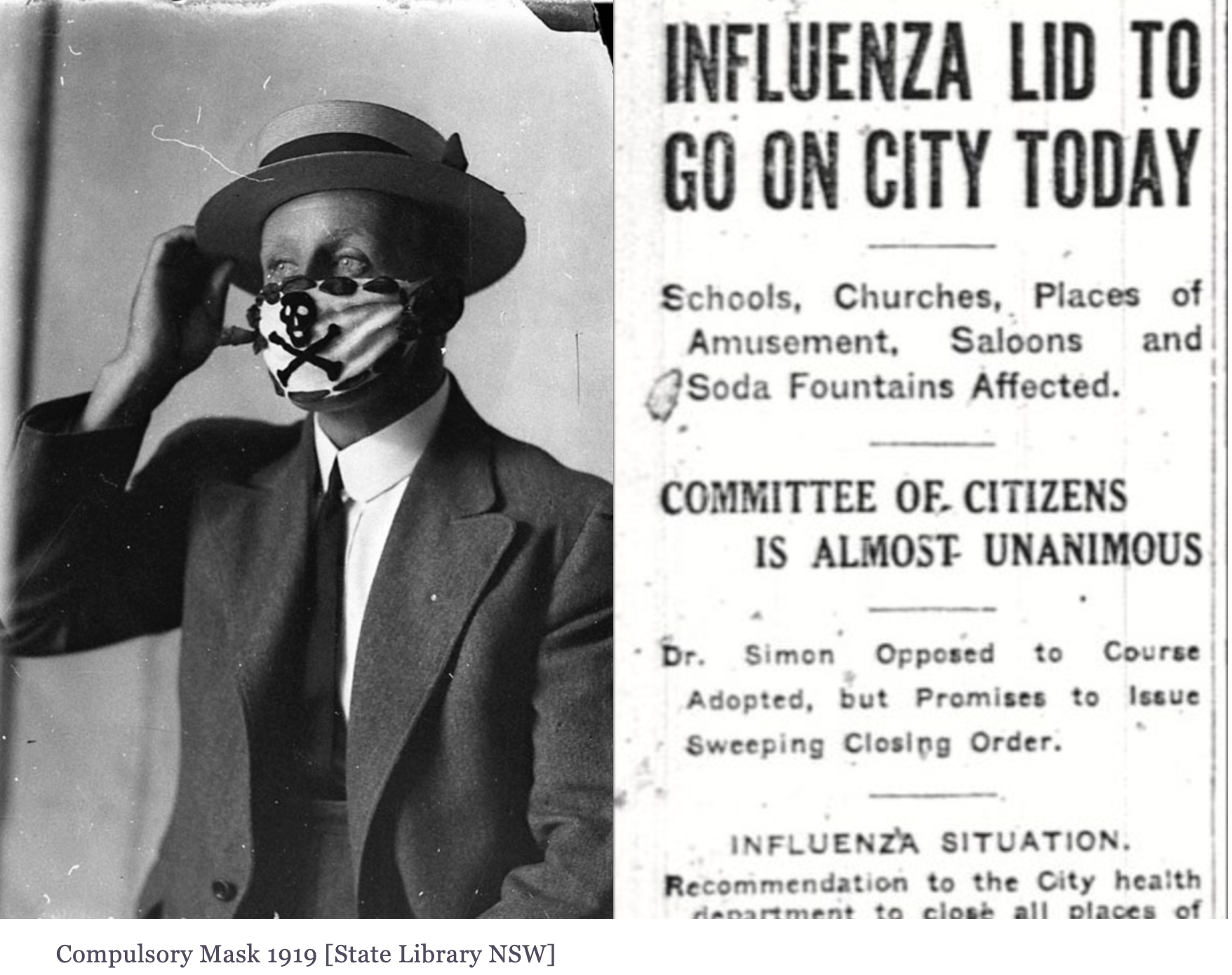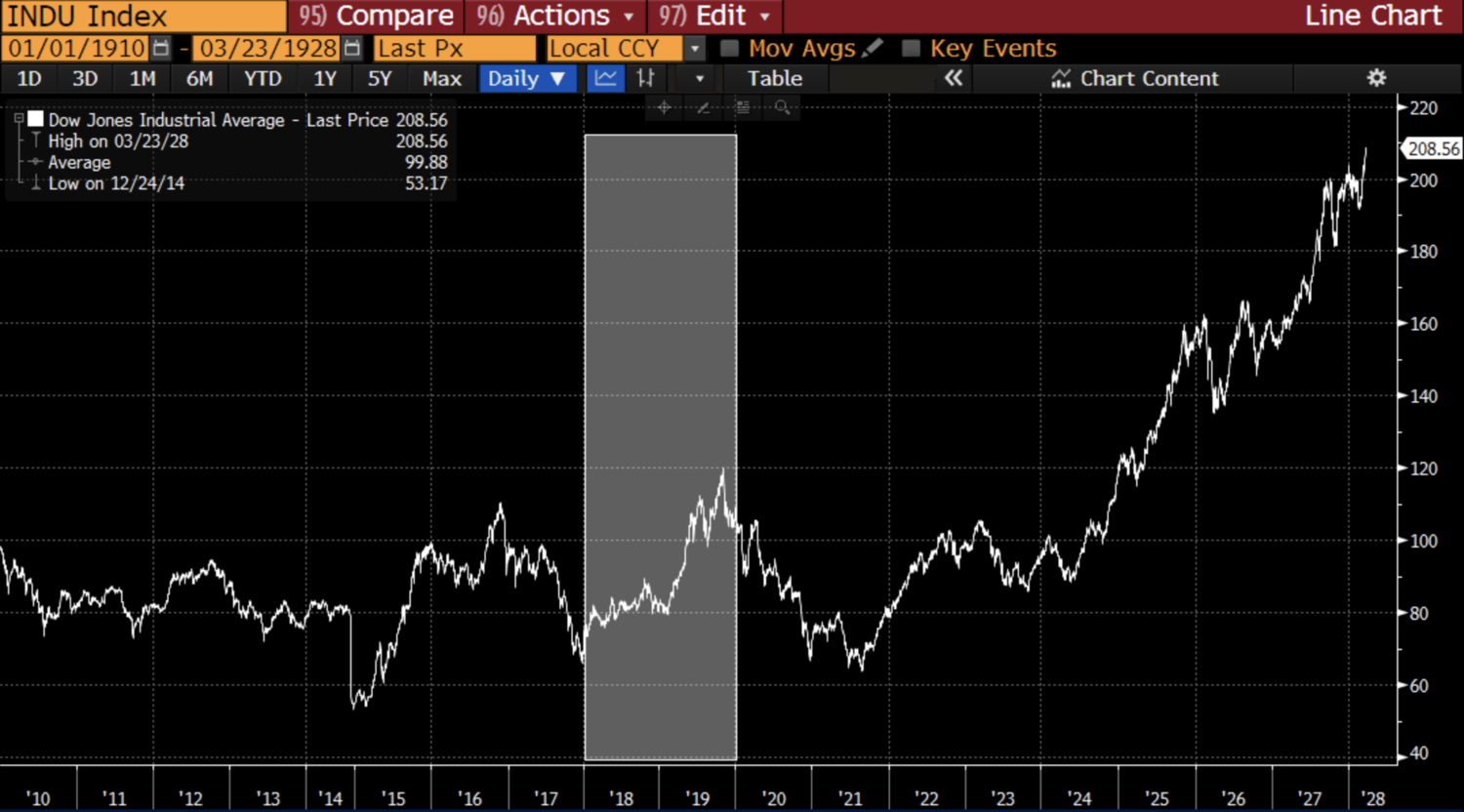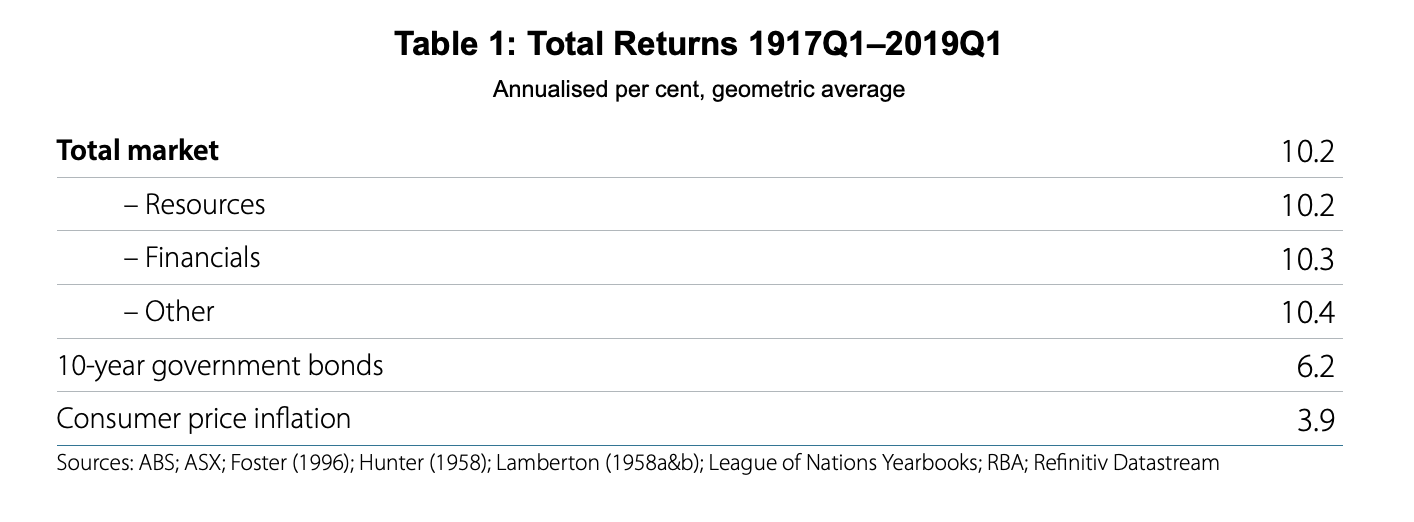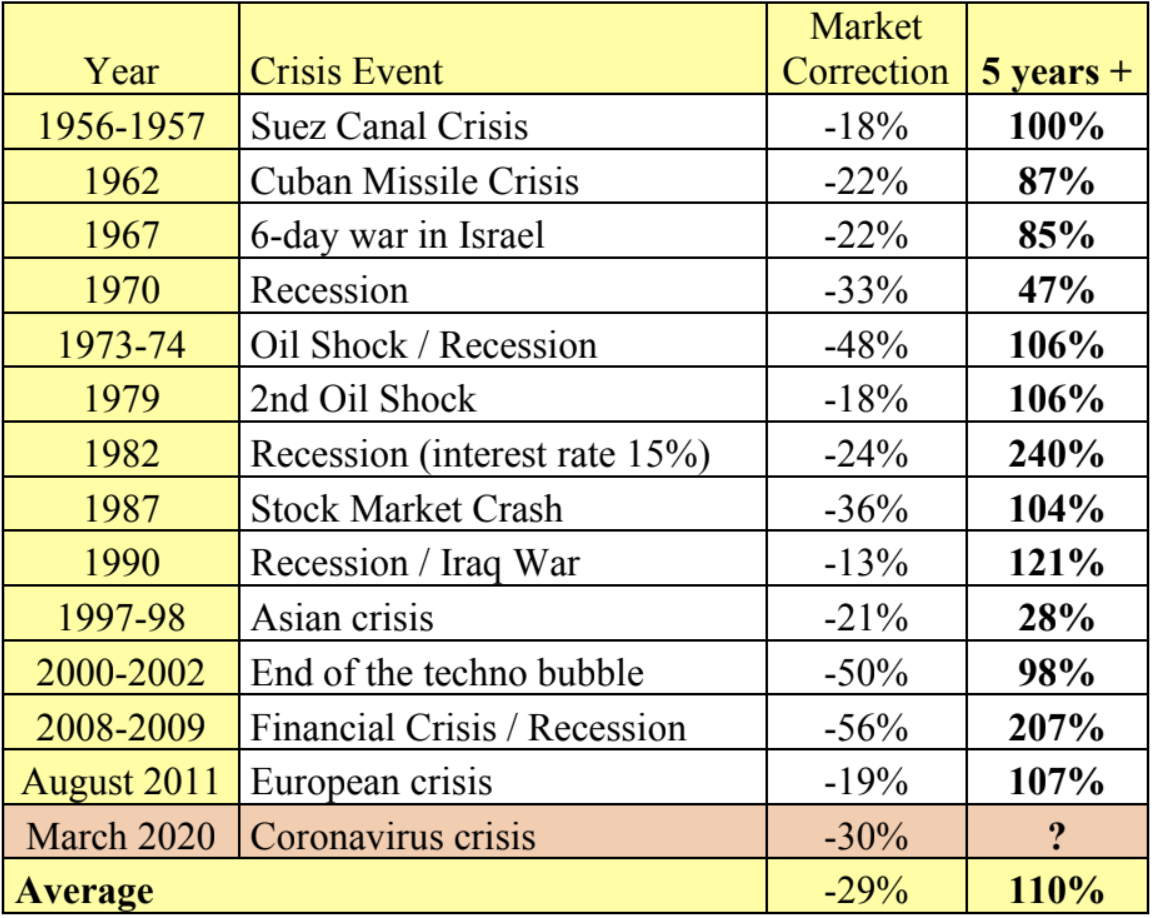PANdemIC - ‘This too shall pass’
Markets hate uncertainty, and right now uncertainty reigns supreme across the globe as the COVID-19 pandemic impacts us all. No one can be certain when it will be contained or even how much damage it will do along the way. Despite this, there are some things that will allow us to view this current pandemic in a more rational light. History can provide a guide to the likely longer term implications for stock markets; human psychology can help us better understand the actions of market participants; and finally, an understanding of market structure can help explain the wild gyrations we are witnessing in the world’s markets.
53

History
“History doesn’t repeat itself, but it does rhyme.” Mark Twain
History can be an invaluable aid when it comes to investing, by providing clues to the future. In his book, Resilience, American Navy Seal, Eric Greitens, helps us understand the power of history.
“Without knowledge of the past, we become lost in the present and fearful of the future. People with a strong sense of the past are often able to deal with hardships of the present. Why? Because as long as we’re part of a story, we’re not alone. Because we know that others have done what we now have to do. Others have suffered and survived; others have been beaten and still, ultimately thrived. Those who don’t know history become lost in the desert of the present.” Eric Greitens
Whilst today’s situation feels unprecedented, the world has experienced pandemics before. The most comparable to today looks to be the 1918 Flu Pandemic (the ‘Spanish flu’), which raged across the globe and took tens of millions of lives in the process. The photo above shows a man wearing a mask that was compulsory at the time. It’s unfortunate no-one alive today is old enough to remember the impact on society during that period, however interestingly, the situation closely mirrors today’s pandemic, as you can see from details held in the NSW State Archives:
“The NSW Government took its first steps in attempting to contain the spread of the disease by issuing the first of many proclamations, beginning with the closure of all ‘libraries, schools, churches, theatres, public halls, and places of indoor resort for public entertainment’.
“This was followed by a trifecta of proclamations: people were required to wear masks covering the mouth and nose; the congregation of people in public spaces was disallowed; and restrictions were placed on crossing from Victoria into NSW.”
“Restrictions continued to be placed on the people of NSW, including the added provisions of the closure of racecourses and hotels, and the banning of public meetings. The impact of the restrictions on employees of many businesses, created the need for relief and support.”
“The NSW Government appointed a Committee of Claims to ‘deal with the various claims made for compensation, on account of loss sustained by reason of the closing down of business places, etc., consequent on the influenza epidemic’, or rather, as a result of the restrictions imposed by the Government as a result of the pandemic. The committee was to carry out the intentions laid out in the Proclamation that the Government would introduce legislation to ‘adjust the losses’ caused by the pandemic.”
“Between January-September 1919, pneumonic influenza, commonly known as the 'Spanish Flu', killed 6,387 people in New South Wales, infecting as many as 290,000 in Metropolitan Sydney alone.”
It is estimated 500 million people globally were infected by the 1918 virus. At least 50 million people were killed around the world, including an estimated 675,000 Americans. The attached chart shows the performance of the Dow Jones from 1917 to 1929.

Dow Jones Index 1910-1928 [Source: Bloomberg]
From January 1917 until March 2020 the Dow Jones Index has delivered a return of 9.75% pa, despite an influenza pandemic, a world war, multiple stock market crashes and a severe depression. And that wasn’t everything.
According to MarketIndex.com.au, the Australian All Ordinaries index rose 11.6% in 1918 and 18.4% in 1919 despite the influenza outbreak. A recent study by the Reserve Bank of Australia shows the average annual returns for the last century from Australian equities: from 1917 until 2019 the Australian stock market delivered a 10.2% annualised return.

Comparing 1918 to today, there are obviously differences too. Today we have a far superior medical understanding, better hospitals, better communications, we have antibiotics and anti-viral drugs. Our challenge is a denser, more interconnected global economy and population. Notwithstanding this, history suggests we will look back on this in years to come as yet another challenge we have managed to overcome. The world will be in a better place, and far better prepared for a pandemic outbreak because we will learn from our experience.
The Last Sixty Years
While we haven’t experienced any pandemics in the last sixty years, we’ve had our fair share of stock market crashes. The attached table, courtesy of Giverny Capital, highlights the average decline for the S&P 500 in each crisis was -29%, while the subsequent return five years hence was +110%.

Source: Giverny Capital
Markets and stock portfolios, provided they are filled with ‘strong companies, with sustainable competitive advantages and healthy balance sheets with the capacity to weather crises and recessions’, have stood the test of time.
In that context, Giverny’s Francois Rochon notes:
“To benefit from the long-term benefits of equities, one ingredient is essential: you must remain invested in equities.”
“It is only those who sell in panic in declines who become the real losers of the volatility inherent in financial markets”
Emotions
In times of crisis, it’s often the mental fortitude which determines the winners from the losers. It’s human nature to prioritise bad news and be scared. I often come back to the imaginary story of two of our ancestors confronting a noise behind a bush in the African savannah. The brave soul who stayed was eaten by the lion, his genes lost forever. The scared individual who ran for his life and survived, went on to procreate, prioritising a sense of fearfulness in all of us.
Controlling your emotions isn’t easy. As a starting point I like to remember this quote from famed psychologist, Daniel Kahneman:
‘Nothing is as important as we think it is while we are thinking about it.’
Right now, it’s hard not to think about COVID-19. It’s everywhere. And controlling your emotions is easier said than done. In his recent book, Alchemy, Rory Sutherland, makes that point.
“Think about it. There are some phrases that just wouldn’t appear in the English language:
- 'I chose not to be angry.’
- 'He plans to fall in love at 4.30pm tomorrow.’
- ‘She decided that she was no longer to feel uneasy in his presence.’
- ‘From that moment on, she determined no longer to be afraid of heights.’
- ‘He decided to like spiders and snakes.’ ”
Acknowledging you will be fearful is a useful first step in overcoming fears and preventing them from impeding your investment decisions.
Recognising the limitations and idiosyncrasies of market structure, understanding what you own, remaining optimistic and adopting a longer-term perspective can help us manage our emotions.
Selling at the bottom of the market is the cardinal sin of investing. In his recent autobiography, Invested, Charles Schwab shares why he reached out to his customers amidst the Global Financial Crisis in 2008:
‘The most natural instinct is to run for the door. To sell. Sell everything,’ I said. ‘You’ve got to fight that emotion because you want to be able to hang on for the recovery. Which has happened every time we have had an experience like this in my career .. and that goes back now some 40 years … nine different cracks in the market like this. Smart investing is about taking it year by year. It is a little bit of a nightmare, but we handle those by living through them and looking forward to better days.’
Market Structure
Today’s market certainly doesn’t resemble anything close to what it was when the Flu Pandemic hit in 1918. The growth in passive investing, ETFs and momentum and high frequency trading over the last decade has made markets more fragile and prone to extreme moves. Less money in the hands of active managers means less firepower to counter computer-based trading. If someone were to sneeze in the cinema during the current crisis, the exits won’t be large enough for the stampede that would ensue. The same is true for markets.
When market participants have little idea what they own and the intrinsic value of their holdings, their only source of news is often share prices. When prices are falling, especially by significant amounts, it’s a sure sign that selling must be the right thing to do. Add to this high frequency and momentum trading, who operate on the premise, ‘no price is too high to buy or too low to sell’ and its little wonder we’ve seen some extraordinary stock moves. I’ve seen stocks move 20-30% in minutes.
In times of crisis, the market doesn’t make distinctions about the quality of the businesses. Everything gets sold. Such stock moves provide opportunity for long term investors who can focus on where the business might be in three to five years’ time. As famed investor, Shelby Davis noted:
“A down market lets you buy more shares in great companies at favourable prices. If you know what you’re doing, you’ll make most of your money from these periods. You just won’t realise it until much later.” Shelby Davis
Market Bottom
Every single US stock market crisis prior to today had one common characteristic: they bottomed. Each went on to record highs. This one will bottom, too. The truth is you won’t pick the bottom, though, not unless you’re a lottery winner or a liar.
The key is to be prepared for the fact that the prices of the stocks you buy may go lower. Provided you buy high quality businesses, you ensure you’re getting more value than you’re paying, and if you take a long-term view, the chance of success is high. Even despite the fact you’ll never pick the bottom.
"Many seem allergic to buying investments in the face of expected bad news - even when prices have fallen to bargain levels - if that news seems likely to drive the price still lower. In a sense, many investors will keep trying to satisfy short-term (and ultimately irrelevant) objectives, even at times when bargains are widespread. After all, securities can always trade lower before they move higher. Trying to identify the absolute low is a fool's errand." Seth Klarman
Stay Optimistic
It’s extraordinary what humans have achieved over the last hundred years. It’s been a mistake to bet against the developing world over that time frame. We are an adaptive, growing, learning society and that’s not likely to change. It may come as a surprise, but many of our greatest achievements came in times of crisis.
A recent post by Morgan Housel touched on the innovations developed during the war years.
“Necessity is the mother of invention, so our willingness to solve problems is about to surge. Take the Great Depression. Economist Alexander Field writes that “the years 1929–1941 were, in the aggregate, the most technologically progressive of any comparable period in U.S. economic history.” Productivity growth was twice as fast in the 1930’s as it was in the decade prior.
The 1920’s were the era of leisure because people could afford to relax. The 1930’s were the era of frantic problem solving because people had no other choice.
The Great Depression brought unimaginable financial pain. It also brought us supermarkets, microwaves, sunscreen, jets, rockets, electron microscopes, magnetic recording, nylon, photocopying, Teflon, helicopters, colour TV, lexiglass, commercial aviation, most forms of plastic, synthetic rubber, laundromats, and countless other discoveries.”
The future is likely to be no different. As Warren Buffett has often reminded us, the children of today will lead better lives than we have.
"Who has ever benefited during the past 238 years by betting against America? If you compare our country’s present condition to that existing in 1776, you have to rub your eyes in wonder. In my lifetime alone, real per-capita U.S. output has sextupled. My parents could not have dreamed in 1930 of the world their son would see." Warren Buffett
Summary
We’re still in the middle of this crisis and I understand it’s very difficult to see the way forward, let alone a date when we can all resume our lives. The news is chock-full of negative sound bites, keeping us up to date with all the grisly news we can consume. And we can consume a lot, let me tell you.
Remember, in the markets, you will only lose when you sell the lows. Keeping a long-term view and knowing you have invested in sound businesses should allow some peace of mind. With the wild swings we have seen in the markets in recent times, businesses are often not priced correctly, and holding on to quality businesses for the future has shown time and time again to be the right way to manage investments during a crisis.
History can teach us a lot, and in addition it can provide us with a sense of ease. For we can look back and know that this too, shall pass.

